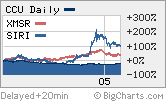 |
| Shares of radio industry leader Clear Channel have fizzled while satellite radio stocks have soared. |
|
|
|
NEW YORK (CNN/Money) -
For most companies that make money from the music business, the past year has been one big party on Wall Street.
Apple (Research) is on a tear thanks to the iPod. Napster (Research), now a site for legal music downloads, has more than doubled. And the stocks of satellite radio firms XM (Research) and Sirius (Research) have surged as well.
But somebody forgot to invite the old-fashioned radio stocks. Shares of seven big radio companies are down an average of 25.5 percent over the past 52 weeks. Ouch.
Satellite killed the radio stocks?
What's ailing radio? Simply put, it's not a growth industry. Ad revenues rose just 2 percent in 2004, to $21.4 billion, according to the Radio Advertising Bureau.
This year is off to a slightly better start, with radio ad sales up 3 percent in January, but that's still not all that exciting.
And if anything, ad spending could deteriorate towards the end of the year, said Kit Spring, an analyst with Stifel Nicolaus, a St. Louis-based investment bank and brokerage house. The absence of spots tied to the Olympics and presidential election will hurt radio companies in the summer and fall, he said.
"Fundamentals will continue to be lackluster this year," said Spring. "The ad environment will get more challenging."
Analysts said the sluggish growth in radio advertising goes in hand in hand with a declining audience. The radio industry is facing too many competitive challenges these days as listeners flock to new formats for music and other audio content.
It's not helping matters that several radio shock jocks have already left for the unregulated confines of satellite radio, and that the most notable, Howard Stern, is set to join Sirius in 2006.
"Threats loom in the form of cable, the proliferation of the iPod and of course satellite radio and the shift of programming talent away from terrestrial radio," said Frederick Moran, an analyst with Stanford Group, a Houston-based investment house. "There are still no signs of recovery in the radio sector's growth."
Tuning in to some buys
With all that said, it's not surprising that analysts have a pretty gloomy picture for most radio stocks. But the group has been pummeled so badly that there are some opportunities.
Angela Kohler, a media analyst with mutual fund firm Federated Investors, said that Clear Channel Communications (Research), the biggest radio operator, looks attractive. Federated owns Clear Channel in several funds.
The company trades at about 12 times cash flow estimates for 2005, a discount to most of its competitors. Analysts tend to look more closely at cash flow for radio and other media firms due to big depreciation and amortization expenses that eat into earnings.
Kohler thinks investors are ignoring a couple of major positives in Clear Channel's story, including its ongoing stock buyback, which should boost earnings, and a move to cut back the amount of ads its stations air.
While that seems counterintuitive, the hope is that the company can attract more listeners, who may have grown tired of heavy commercial schedules, and thus charge premium prices for the reduced available ad time.
"What Clear Channel is doing is the right strategy. At these valuations people are scared and you can make a lot of money on fear," said Kohler.
Spring at Stifel Nicolaus agrees that Clear Channel, which is due to report results on Friday, is a bargain. He says the company should be helped by its outdoor advertising business, which accounts for nearly a quarter of sales. Although the ad market for radio is soft, that's not the case for billboards, Spring said.
In fact, Stanford's Moran said the one company he does have a buy rating on is a pure-play billboard operator: Lamar Advertising (Research). The company is expected to post an 11 percent increase in sales this year while the radio companies he follows will probably report revenue gains in the low single digits.
"This is the one ad-driven media play that stands out significantly. Lamar is seeing rising occupancy rates and deserves a premium multiple," Moran said.
The only other companies in radio that look compelling are those focusing on ethnic or racial markets.
Spring likes Entravision Communications (Research), which owns radio and TV stations as well as a billboard business that targets Spanish-speaking consumers in the United States. Sales are expected to grow 7 percent this year and 8 percent in 2006.
And Kohler said Radio One, which targets the African-American community, is a holding in some of Federated's funds. She said Radio One (Research) has a unique niche that positions it well for growth. As such, revenues are expected to be up 15 percent this year.
So even though the industry as a whole will probably face another tough year, Kohler thinks investors shouldn't punish every radio company.
"We're very cautious but there's a little too much pessimism," she said.
Analysts quoted in this story do not personally own any of the stocks mentioned and their firms have no investment banking ties to the companies.
Sign up to receive the Tech Investor column by e-mail.
Plus, see more tech commentary and get the latest tech news.

|